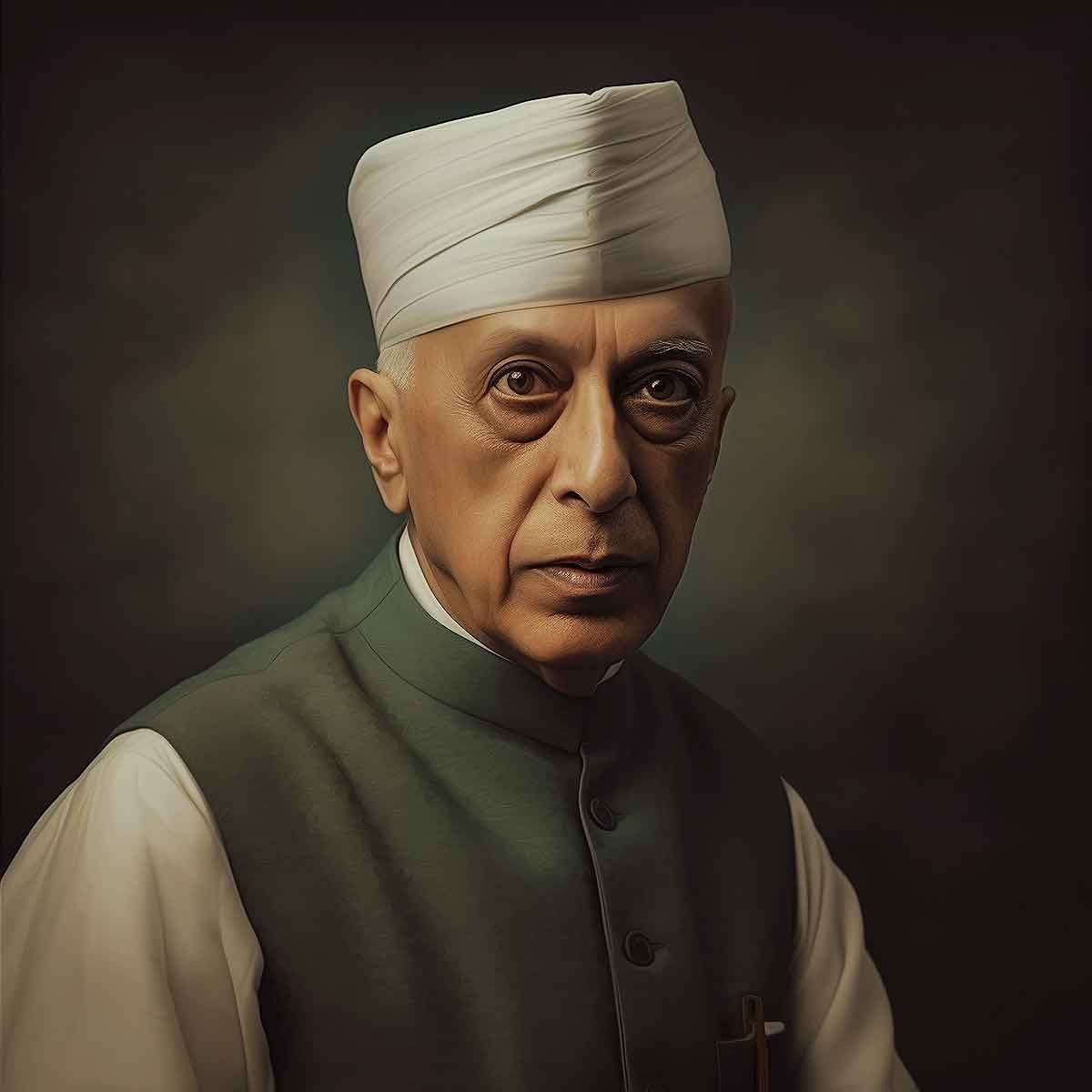Sanatan Articles
Satyaagrah
Written on
Satyaagrah
Written on
Satyaagrah
Written on
Satyaagrah
Written on
Satyaagrah
Written on
JOIN SATYAAGRAH SOCIAL MEDIA
"Betrayal is the birthplace of resentment": Diving into murky depths of Nehru & Elwin's policies in Northeast India unveils a legacy of disruption, a region converted, culture exploited & nation betrayed - glaring testament to their ill-conceived actions

"Betrayal is the birthplace of resentment": Diving into murky depths of Nehru & Elwin's policies in Northeast India unveils a legacy of disruption, a region converted, culture exploited & nation betrayed - glaring testament to their ill-conceived actions
In October 1964, an article emerged from United News of India (UNI) with a cryptic statement - Nagaland safe from Sadhus. What did this unusual remark mean?
|
Behind this seemingly mysterious phrase lies a regrettable episode of Indian history. This was the result of a pact between then Prime Minister Jawaharlal Nehru and Dr. Verier Elwin, which restricted the entry of sadhus into Nagaland, a state in the northeast of India.
Under this pact, Nehru prohibited sadhus, or Hindu holy men, from entering Nagaland, creating a free path for Christian missionaries. This move has been viewed with widespread resentment and seen as a betrayal by many in India. The Christian population in Nagaland jumped dramatically from 20% in 1947 to a whopping 95% due to this policy.
The chilling aftermath of Nehru's decision took hold only five months after his death when Hindus began contemplating a return to Nagaland. However, it was too late. Nehru's decisions had inadvertently accelerated the process of religious conversion in most of the Northeast. Many believe that the Congress Party, which Nehru led, is responsible for numerous challenges faced by Northeastern states like Manipur and Assam.
Nehru's decisions, misguided by a flawed understanding of the issues, a distorted worldview, and a defective grasp of national security interests, led to policies that adversely impacted Assam and the Northeast. Among these was his politically motivated allowance for migrations from East Pakistan, which led to significant demographic changes.
|
Another devastating decision was Nehru's policy of dividing Assam into smaller states based on ethnicity, a move that had negative consequences. More than 220 distinct ethnic groups exist in the region. This division led to a surge in divisive identity politics and demands for separation, even though the small states weren't economically viable.
Dr. Verrier Elwin, a British missionary and anthropologist, and Nehru's advisor on tribal matters, played a considerable role in shaping these harmful policies. Elwin urged Nehru to treat tribes like the Nagas as "anthropological specimens," which obstructed the development and integration of the Northeast into the Indian mainstream.
Verrier Elwin was an intriguing figure - a British-born Indian anthropologist who began his career as a Christian missionary in India. Elwin initially worked with Mahatma Gandhi and the Indian National Congress but diverged from them over disagreements about tribal assimilation. Elwin is known for his studies on the Baigas and Gonds of Orissa and Madhya Pradesh in central India.
In his pursuit of anthropology, Elwin engaged in questionable practices. At 40, he married his 13-year-old tribal student, Kosi. Elwin exploited her as a subject for his anthropological research, publishing intimate details about their life together, a method known as participant observation. Nine years later, he abandoned Kosi in poverty and married Leela, another tribal girl from NEFA (Arunachal Pradesh).
|
Elwin's influence over Nehru was so strong that he was appointed as the Anthropological Adviser to the Government of NEFA (today known as Arunachal Pradesh). Elwin's preservation policy led to a segregation of the Northeast from the rest of India for over fifty years. He left a damaging legacy of churches, community hostilities, and a separate Christian State of Nagaland.
Elwin's contributions were controversially recognized by the Government of India, who awarded him the third-highest civilian honor of the Padma Bhushan in 1961. Even his autobiography, The Tribal World of Verrier Elwin, won him the 1965 Sahitya Akademi Award in the English Language. However, Dr. Lohia, a contemporary of Elwin's, heavily criticized his work, describing it as disgraceful and barbaric.
The challenges of the Northeast could have been addressed by providing good governance, a strong criminal justice system, reliable security, access to services, education, healthcare, improved connectivity, adequate infrastructure, and economic development. However, the Congress Party's socialist ideology, further cemented by Nehru, led India down a path of poverty, want, and international dependency, with no surplus to invest in development.
|
To compound the problem, the PCB nexus (Politicians, Contractors, Businessmen, and Bureaucrats), and in many regions, the PCBI nexus (PCB plus Insurgents) took charge of a significant portion of the funds. Without ensuring the proper use of funds, the Central Government kept announcing special economic packages for the region. These funds, instead of improving the lives of the people, mostly filled the pockets of the corrupt members of the PCBI nexus.
Continued militancy in the region and the need for development to combat it provide a convenient excuse to request more funds, which only leads to more corruption. It's clear that the roots of the problems facing the Northeast are deep, originating from the era of Nehru, and persisting due to ongoing neglect and mismanagement.
 Support Us
Support Us
Satyagraha was born from the heart of our land, with an undying aim to unveil the true essence of Bharat. It seeks to illuminate the hidden tales of our valiant freedom fighters and the rich chronicles that haven't yet sung their complete melody in the mainstream.
While platforms like NDTV and 'The Wire' effortlessly garner funds under the banner of safeguarding democracy, we at Satyagraha walk a different path. Our strength and resonance come from you. In this journey to weave a stronger Bharat, every little contribution amplifies our voice. Let's come together, contribute as you can, and champion the true spirit of our nation.
 |  |  |
| ICICI Bank of Satyaagrah | Razorpay Bank of Satyaagrah | PayPal Bank of Satyaagrah - For International Payments |
If all above doesn't work, then try the LINK below:
Please share the article on other platforms
DISCLAIMER: The author is solely responsible for the views expressed in this article. The author carries the responsibility for citing and/or licensing of images utilized within the text. The website also frequently uses non-commercial images for representational purposes only in line with the article. We are not responsible for the authenticity of such images. If some images have a copyright issue, we request the person/entity to contact us at satyaagrahindia@gmail.com and we will take the necessary actions to resolve the issue.
Related Articles
- British PM accepted that “the tide of nationalism is running very fast in India" and the mutiny of the Royal Indian Navy in 1946 forced colonial masters Britain to leave India: What followed was betrayal by Congress
- "In loyalty's absence, betrayal finds its stage": Indians sacrificed their life earnings to Netaji for a dream called freedom, Nehru, however, fancied a different richness: gifting it to Pakistan, Legacy decisions, they call it was one more great betrayal
- Ghost from the past: Unseen picture of Nehru voting in favour of partition of India goes viral
- When Secular Nehru Opposed Restoration Of Somnath Temple - The Somnath Temple treachery
- "You cannot change what you refuse to confront": Ashutosh Lahiry approached Nehru seeking assistance for the suffering Hindu refugees and to take action to alleviate their plight, but Nehru refused citing his commitment to Gandhian pacifism and secularism
- Netaji, an Impossible man can never be boxed into an ideological corner: Not just the most enigmatic figure in world history but his life is also a tough lesson in how to think about history
- When Nehru ignored warnings from Sardar Patel and Sri Aurobindo and shocked USA President: Chinese Betryal and loss of centuries old ally
- Nehru's Himalayan Blunders which costed India dearly - Pre-Independence
- If only India’s partition chilling wound was not enough, Gandhi did his last protest again only to blackmail India into giving 55 crores to Pakistan, dragged Hindu, Sikh refugees seeking shelter in mosques to die in cold: And we call him Mahatma, not for
- The untold story of Maharashtrian Brahmin genocide committed by Congress after Gandhi’s assassination in 1948
- Harmonizing Nathuram Godse: Why India should move beyond denouncing him, a man who altered the course of not only the politics of the country but the very history of the Hindu Civilisation and, by extension, the world at large
- The first large-scale massacre in Independent India accounts for one of the biggest coverups in modern history: It is about time we talk about the 1948 genocide of Maharashtrian Brahmins following MK Gandhi’s assassination
- During ‘Kheti Bachao Yatra’ in Kurukshetra Shehjada Gandhi claimed of throwing China out from Indian Territory ‘in 15 minutes’: From Nehru’s Himalayan blunder to UPA’s silence as China took over Indian land in Ladakh
- "Loyalty to petrified opinion never yet broke a chain or freed a human soul": The First PM of India, Jawaharlal Nehru in 1956 took Freeman's oath "to be true to the Queen of England", and was given documents of the Freedom, contained in ornamental caskets
- Lets take a new year resolution together to liberate Bharatiya history from the paws of colonial effect





















